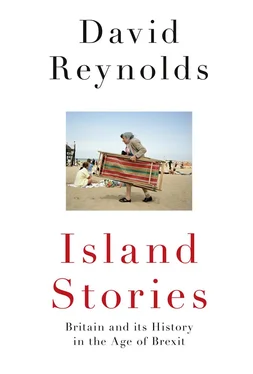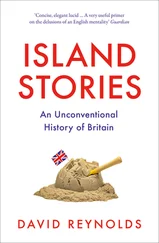Established at strategic points around the globe, able to project power through a strong navy and merchant fleet, Britain after 1815 also enjoyed the huge advantage of becoming the world’s first industrial nation. The country’s initial manufacturing surge had been driven by the cotton trade. All the raw material was imported and most of the production was for export. By 1830, cotton goods accounted for half the value of British exports and raw cotton made up 20 per cent of net imports. After the cotton boom subsided, iron and steel became the new growth sector, stimulated by the railway-building mania of the 1830s and 1840s, and then sustained by British dominance in the financing and construction of railways around the world. By 1860, a country with only 2 per cent of the world’s population was producing half the world’s iron and steel and accounted for 40 per cent of world trade in manufactured goods. It had the highest GDP in the world and its population, despite vast inequalities of wealth, enjoyed the highest average per capita income. [33] Конец ознакомительного фрагмента. Текст предоставлен ООО «ЛитРес». Прочитайте эту книгу целиком, купив полную легальную версию на ЛитРес. Безопасно оплатить книгу можно банковской картой Visa, MasterCard, Maestro, со счета мобильного телефона, с платежного терминала, в салоне МТС или Связной, через PayPal, WebMoney, Яндекс.Деньги, QIWI Кошелек, бонусными картами или другим удобным Вам способом.
During much of the Victorian era, therefore, Britain did seem truly great as the leading colonial empire, the world’s industrial giant and the dominant sea power. In the decades after 1815, the Royal Navy appeared to rule the waves, driving piracy from the Indian Ocean and the China Seas, confronting slave traders in the Caribbean and South Atlantic, and aggressively promoting Britain’s commercial interests – particularly in the Opium War of 1839–42 to open up China to British trade. Many foreign leaders had no doubt that British power was decisive. ‘Only England, mistress of the seas, can protect us against the united force of European reaction,’ exclaimed Simón BolÍvar, the liberator of South America, as he contemplated the danger of Spanish reconquest. Muhammad Ali, the Ottomans’ unruly viceroy of Egypt, remarked that ‘with the English for my friends I can do anything: without their friendship I can do nothing’. [34] Конец ознакомительного фрагмента. Текст предоставлен ООО «ЛитРес». Прочитайте эту книгу целиком, купив полную легальную версию на ЛитРес. Безопасно оплатить книгу можно банковской картой Visa, MasterCard, Maestro, со счета мобильного телефона, с платежного терминала, в салоне МТС или Связной, через PayPal, WebMoney, Яндекс.Деньги, QIWI Кошелек, бонусными картами или другим удобным Вам способом.
The analogy between the Pax Britannica and the Pax Romana did not sound far-fetched. Like Rome, Britain seemed to rule or shape much of the world, and was what the poet Alfred Tennyson rhapsodised in 1886 as
… the mightiest Ocean-power on earth
Our own fair isle, the lord of every sea. [35] Конец ознакомительного фрагмента. Текст предоставлен ООО «ЛитРес». Прочитайте эту книгу целиком, купив полную легальную версию на ЛитРес. Безопасно оплатить книгу можно банковской картой Visa, MasterCard, Maestro, со счета мобильного телефона, с платежного терминала, в салоне МТС или Связной, через PayPal, WebMoney, Яндекс.Деньги, QIWI Кошелек, бонусными картами или другим удобным Вам способом.
The country’s global power was on flamboyant display during celebrations for Victoria’s Diamond Jubilee in June 1897. A week of martial festivities culminated in a vast naval pageant off the Isle of Wight when the Queen reviewed 165 of her warships manned by 40,000 sailors. The highpoint was 22 June when Her Majesty processed in state along six miles of London streets amid cheering crowds. Speaking for most observers, the Manchester Guardian described the theme of the celebrations as ‘the world-wide Empire of Britain … the exultant expression of a power the greatest in the world’s history’. Onlookers were particularly intrigued by contingents of troops from the Queen’s domains all over the globe. A reporter for the new popular newspaper The Daily Mail could hardly contain his patriotic fervour as he described them marching up Ludgate Hill to St Paul’s:
white men, yellow men, brown men, black men, every colour, every continent, every race, every speech – and all up in arms for THE BRITISH EMPIRE AND THE BRITISH QUEEN. Up they came, more and more, new types, new realms at every couple of yards, an anthropological museum – a living gazeteer of the British Empire. With them came their English officers, whom they obey and follow like children. And you begin to understand, as never before what the Empire amounts to. [36] Конец ознакомительного фрагмента. Текст предоставлен ООО «ЛитРес». Прочитайте эту книгу целиком, купив полную легальную версию на ЛитРес. Безопасно оплатить книгу можно банковской картой Visa, MasterCard, Maestro, со счета мобильного телефона, с платежного терминала, в салоне МТС или Связной, через PayPal, WebMoney, Яндекс.Деньги, QIWI Кошелек, бонусными картами или другим удобным Вам способом.
Much of the rhetoric from that week in June 1897 was similarly extravagant, often preposterous. A jubilee mug, inscribed with portraits of the 78-year-old monarch, carried the legend The Centre of a World’s Desire . A Canadian poet penned his own tribute:
Here’s to Queen Victoria
Dressed in all her regalia
With one foot in Canada
And the other in Australia. [37] Конец ознакомительного фрагмента. Текст предоставлен ООО «ЛитРес». Прочитайте эту книгу целиком, купив полную легальную версию на ЛитРес. Безопасно оплатить книгу можно банковской картой Visa, MasterCard, Maestro, со счета мобильного телефона, с платежного терминала, в салоне МТС или Связной, через PayPal, WebMoney, Яндекс.Деньги, QIWI Кошелек, бонусными картами или другим удобным Вам способом.
A truly remarkable posture, but not one that could be sustained for long. In fact, the world we have lost was one that we were bound to lose. Britain’s global power was always more limited than appearances suggested. A closer look at the nature of that power – economic, international and imperial – will help explain why.
Читать дальше












